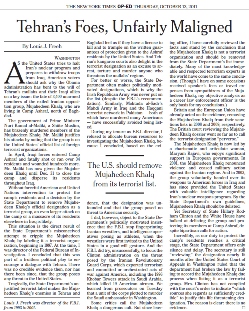THE NEW YORK TIMES
Washington – As the United States tries to halt Iran’s nuclear program and prepares to withdraw troops from Iraq, American voters should ask why the Obama administration has bent to the will of Tehran’s mullahs and their Iraqi allies on a key issue: the fate of 3,400 unarmed members of the exiled Iranian opposition group, Mujahedeen Khalq, who are living in Camp Ashraf, north of Baghdad.
The government of Prime Minister Nuri Kamal al-Maliki, a Shiite Muslim, has brazenly murdered members of the Mujahedeen Khalq. Mr. Maliki justifies his attacks by noting that the group is on the United States’ official list of foreign terrorist organizations.
In April, Iraqi forces entered Camp Ashraf and fatally shot or ran over 34 residents and wounded hundreds more. Mr. Maliki has now given the Mujahedeen Khalq until Dec. 31 to close the camp and disperse its residents throughout Iraq.
Without forceful American and United Nations intervention to protect the camp’s residents and a decision by the State Department to remove Mujahedeen Khalq’s official designation as a terrorist group, an even larger attack on the camp or a massacre of its residents elsewhere in Iraq is likely.
This situation is the direct result of the State Department’s misconceived attempt to cripple the Mujahedeen Khalq by labeling it a terrorist organization, beginning in 1997. At the time, I was director of the Federal Bureau of Investigation. I concluded that this was part of a fruitless political ploy to encourage a dialogue with Tehran. There was no credible evidence then, nor has there been since, that the group poses any threat to the United States.
Tragically, the State Department’s unjustified terrorist label makes the Mujahedeen Khalq’s enemies in Tehran and Baghdad feel as if they have a license to kill and to trample on the written guarantees of protection given to the Ashraf residents by the United States. And Tehran’s kangaroo courts also delight in the terrorist designation as an excuse to arrest, torture and murder anyone who threatens the mullahs’ regime.
For better or worse, the State Department often makes politically motivated designations, which is why the Irish Republican Army was never put on the list (despite the F.B.I.’s recommendation). Similarly, Moktada al-Sadr’s Mahdi Army in Iraq and the Haqqani terrorist network in Pakistan — both of which have murdered many Americans — have successfully avoided being listed.
During my tenure as F.B.I. director, I refused to allocate bureau resources to investigating the Mujahedeen Khalq, because I concluded, based on the evidence, that the designation was unfounded and that the group posed no threat to American security.
I did, however, object to the State Department’s politically motivated insistence that the F.B.I. stop fingerprinting Iranian wrestlers, and intelligence operatives posing as athletes, when the wrestlers were first invited to the United States in a good-will gesture. And the F.B.I. did try, unsuccessfully, to focus the Clinton administration on the threat posed by the Iranian Revolutionary Guard Corps, which exported terrorism and committed or orchestrated acts of war against America, including the 1996 Khobar Towers attack in Saudi Arabia, which killed 19 American airmen. We learned from prosecutors on Tuesday that a unit of the corps plotted to murder the Saudi ambassador in Washington.
Some critics call the Mujahedeen Khalq a dangerous cult. But since leaving office, I have carefully reviewed the facts and stand by the conclusion that the Mujahedeen Khalq is not a terrorist organization and should be removed from the State Department’s list immediately. Many of the most knowledgeable and respected terrorism experts in the world have come to the same conclusion. (Though I have on some occasions received speaker’s fees or travel expenses from sympathizers of the Mujahedeen Khalq, my objective analysis as a career law enforcement officer is the only basis for my conclusions.)
Britain and the European Union have already acted on the evidence, removing the Mujahedeen Khalq from their sanctions lists in 2008 and 2009, respectively. The British court reviewing the Mujahedeen Khalq dossier went so far as to call the terrorist designation “perverse.”
The Mujahedeen Khalq is now led by a charismatic and articulate woman, Maryam Rajavi, who enjoys significant support in European governments. In 2001, the Mujahedeen Khalq renounced violence and ceased military action against the Iranian regime. And in 2003, the group voluntarily handed over its weapons to American forces in Iraq and has since provided the United States with valuable intelligence regarding Iran’s nuclear weapons program. By the State Department’s own guidelines, Mujahedeen Khalq should be delisted.
Yet Secretary of State Hillary Rodham Clinton and the White House have balked at delisting the group and protecting its members at Camp Ashraf, despite bipartisan calls for action.
Incredibly, as our duty to protect the camp’s residents reaches a critical stage, the State Department offers only silence and delay. The secretary is still “reviewing” the designation nearly 15 months after the United States Court of Appeals in Washington ruled that the department had broken the law by failing to accord the Mujahedeen Khalq due process when listing it as a terrorist group. Mrs. Clinton has not complied with the court’s order to indicate “which sources she regards as sufficiently credible” to justify this life-threatening designation. The reason is clear: there is no evidence.
Louis J. Freeh was director of the F.B.I. from 1993 to 2001.
http://www.nytimes.com/2011/10/13/opinion/tehrans-foes-unfairly-maligned.html

